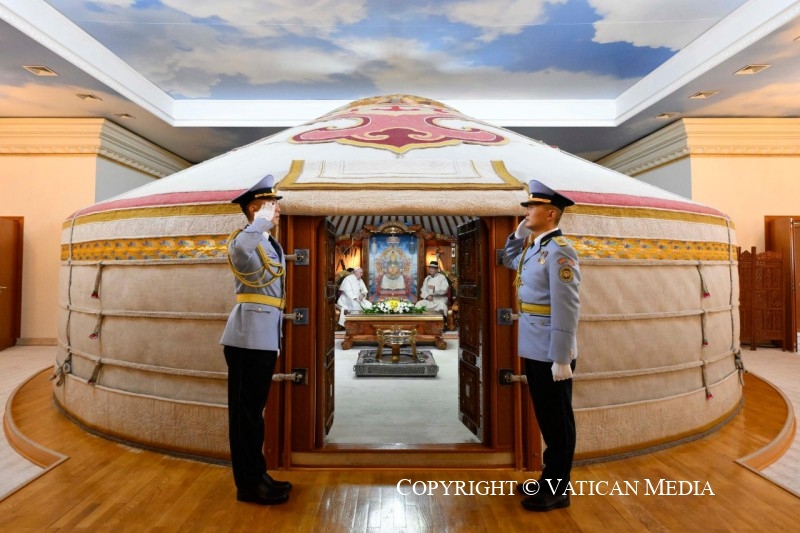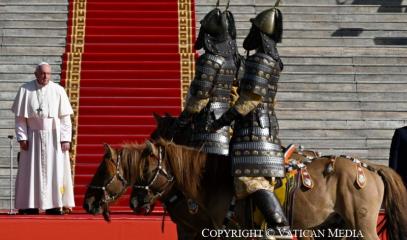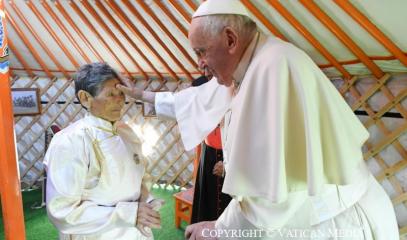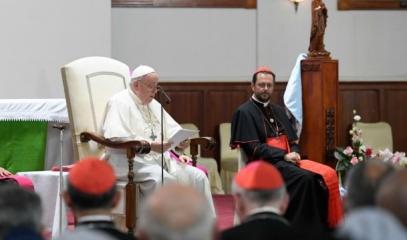Pope in Ulaanbaator: May heaven dispels the clouds of war
In the Mongolian capital, Francis praised Mongolia's non-nuclear status in his address to local authorities. In a city shaken by recent protests over a coal scandal, the pontiff spoke out against corruption "that impoverishes entire countries". In the cathedral, he met with the small local Church, urging simplicity and closeness to the people. Numbers and success are “not how God works.” He also blessed a statue of the Immaculate Conception found in a landfill, a great sign.
Ulaanbaator (AsiaNews) – In Mongolia, people say, “the clouds pass away, but the sky remains.” In citing this proverb in his first, long address in the heart of Asia, the pontiff reiterated this morning his message of peace during the meeting with the authorities and the diplomatic corps in the State Palace of the Mongolian capital.
Pope Francis arrived with President Ukhnaagiin Khürelsükh, after the official welcome in the central Sükhbaatar Square, in the shadow of the great monument to Genghis Khan.
“May the dark clouds of war be dispelled,” he said, “swept away by the firm desire for a universal fraternity wherein tensions are resolved through encounter and dialogue, and the fundamental rights of all people are guaranteed!
“Here, in this country so rich in history and open to the sky, let us implore this gift from on High, and together let us strive to build a future of peace.”
In mentioning the tradition of the ancient Mongol empire, the "pax mongolica”, Francis stressed “the remarkable ability of your ancestors to acknowledge the outstanding qualities of the peoples present in its immense territory and to put those qualities at the service of a common development.”
Turning to the present, he praised Mongolia’s “determination to halt nuclear proliferation and to present yourselves before the world as a country free of nuclear weapons”; for him, the message and traditions that the country of silence and steppes offers the world, is that of keeping “your gaze fixed on high”.
For Pope Francis, Mongolia’s "smart and green" living space goes way back, a reflection of the country’s iconic wisdom in protecting creation, “matured over generations of herders and planters respectful of the delicate balances of the ecosystem”.
This “speaks eloquently to those who in our own day reject the pursuit of myopic particular interests and wish instead to pass on to future generations lands that remain welcoming and fruitful.”
Each ger, with a round window at its top, lets in the light and allows people to admire the sky. This gives Francis a chance to speak about the religiosity of the Mongolian people.
“In the contemplation of boundless and sparsely settled horizons, your people have developed a refined spiritual sense, born of nurturing silence and interiority,” he said.
At present, this is a very important resource given “the threat represented by the consumerist spirit that nowadays, in addition to creating great injustices, leads to an individualistic mindset that cares little for others and for sound established traditions.”
Gazing skyward is an antidote to the evil that everyone knows well today in Mongolia, namely corruption that brought thousands of people into the streets in recent months following scandals involving coal sales to China.
The pope did not hesitate to talk about it in front of local political leaders. Corruption, for him, is an insidious danger that “effectively represents a serious menace to the development of any human community; corruption is the fruit of a utilitarian and unscrupulous mentality that has impoverished whole countries. [. . .] It is a sign of a vision that fails to look up to the sky and flees the vast horizons of fraternity, becoming instead self-enclosed and concerned with its own interests alone.”
Speaking about the religious freedom that is now guaranteed in the Mongolian constitution, he is fully cognisant that not long ago, this was not the case.
The State Palace where he spoke is located where Ikh Khüree, the old Buddhist monastic-city complex, stood, until it was completely destroyed by the country’s communist regime in the 1930s in a wave of religious persecution that caused thousands of deaths.
Thirty years ago, the country turned the page, opening a season of religious rebirth, which even the small Catholic community has been able to enjoy. Pope Francis noted that Syriac missionaries, the great evangelisers of the first millennium, were the first to arrive; then, at the time of the Mongol empire, Pope Innocent IV sent Brother Giovanni di Pian del Carpine, a Franciscan, as his envoy in 1246.
With such an historical precedent, the pontiff gave the Mongolian president an authenticated copy of the letter the Great Khan sent to the pope, in traditional Mongolian script, in response to the papal missive. The original document is preserved in the Vatican Library.
“May it be the sign of an ancient friendship that is growing and being renewed,” Francis said.
Speaking about ongoing talks on a bilateral agreement between Mongolia and the Holy See, which would represent an important step for the country’s small Catholic community, Francis said that such an accord would provide those “conditions essential for the pursuit of the ordinary activities in which the Catholic Church is engaged.”
The pontiff’s second meeting of the day was with Mongolia’s small community of just 1,500 members, who today achieved the unusual "record" of cramming together with the pontiff in the same picture. The venue was Ulaanbaator’s Cathedral of Saints Peter and Paul, which also saw the presence of local and other Asian bishops, as well as missionaries and pastoral workers.
After listening to Sister Salvia, a missionary of Charity, and Fr Peter Sanjaajav (one of two Mongolian priests), Pope Francis stressed the words of Rufina, a local convert who became a catechist, and who said: "Here we are like children who ask so many questions about faith".
In his address, the pontiff outlined the style of the missionary presence of the Church, in Mongolia as in any other frontier lands for the Gospel.
"[G]overnments and secular institutions have nothing to fear from the Church’s work of evangelisation, for she has no political agenda to advance, but is sustained by the quiet power of God’s grace and a message of mercy and truth, which is meant to promote the good of all.
“May you always be close to the people, with that closeness that is God’s way. God is close, compassionate and tender. Closeness, compassion and tenderness: treat people like that, personally caring for them, learning their language, respecting and loving their culture, not allowing yourselves to be tempted by worldly forms of security, but remaining steadfast in the Gospel through exemplary moral and spiritual lives.
“Simplicity and closeness! Never tire of bringing to Jesus the faces and the situations you encounter, the problems and concerns. Devote time to daily prayer, which will enable you to persevere in the work of service and to draw consolation from the ‘God of all consolation’ (2 Cor 1:3), and thus bring hope to the hearts of all those who suffer.”
As for the numbers, Francis praised smallness in Ulaanbaator as he did last year in Kazakhstan. “[D]o not be concerned about small numbers, limited success, or apparent irrelevance. That is not how God works,” he explained.
Indeed, Francis urged the faithful to be guided by the statue of the Immaculate Conception found in a rubbish heap, a great sign that marks this small Church. AsiaNews had already reported it last Christmas.
Before the meeting in the cathedral, Francis saw the woman who found the image, who welcomed him into her ger.
The Holy Father blessed the “statue of the Immaculate Mother”, saying that “undefiled by sin, she wanted to draw so close to us as to descend to the dregs of society”.
He compared her to the “Mongolian tradition of the suun dalai ijii, the mother with the heart as big as an ocean of milk.”
“Let us keep our gaze fixed on Mary, who in her littleness is greater than the heavens, for within her she bore the One whom the heavens and the highest heavens cannot contain”.
“[L]et us entrust ourselves to her, asking for a renewed zeal and an ardent love that tirelessly and joyfully bears witness to the Gospel. Onwards! [. . .] The Lord himself has chosen you and believes in you”.










.png)










